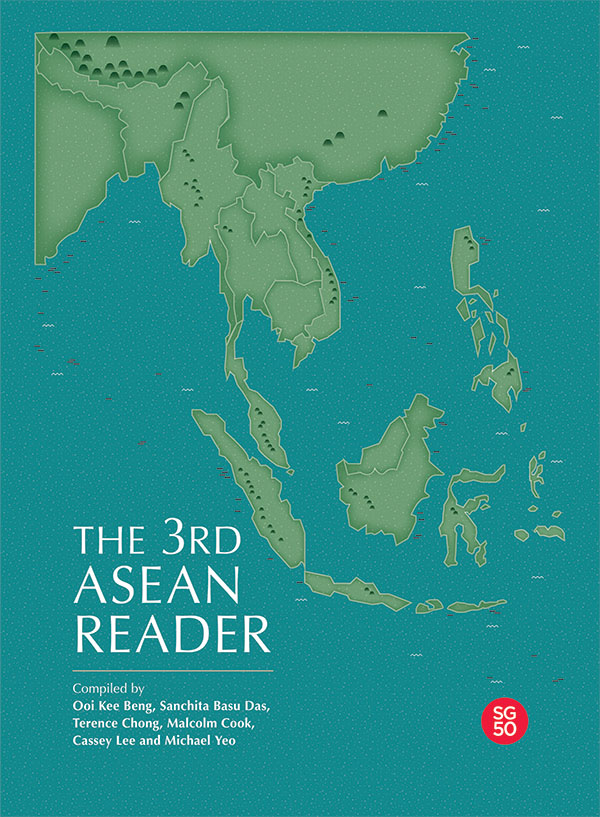Book contents
- Frontmatter
- Contents
- Preface
- Forewords to the First and Second ASEAN Reader: ASEAN: Conception and Evolution
- Forewords to the First and Second ASEAN Reader: ASEAN: The Way Ahead
- Forewords to the First and Second ASEAN Reader: New Challenges for ASEAN
- SECTION I ASEAN: THE LONG VIEW
- Section Introduction by
- 1 Southeast Asia and Foreign Empires
- 2 The Evolving Nature of ASEAN's Economic Cooperation: Original Vision and Current Practice
- 3 The Evolving Nature of ASEAN's Economic Cooperation: Original Vision and Current Practice
- 4 From Political/Security Concerns to Regional Economic Integration
- SECTION II COUNTRY ANALYSES
- SECTION III COMPARATIVE ANALYSES OF THE REGION
- Southeast Asian Societies
- The Southeast Asian Economy
- Southeast Asian Politics
- SECTION IV INTERNATIONAL DEVELOPMENTS
- SECTION V INSTITUTIONS OF ASEAN
- SECTION VI ASSESSING ASEAN'S INTERNAL POLICIES
- ASEAN Political Security Community
- ASEAN Economic Community
- ASEAN Socio-Cultural Community
- SECTION VII ASSESSING ASEAN'S EXTERNAL INITIATIVES
- ASEAN Processes
- ASEAN's Major Power Relations
- SECTION VIII SOUTHEAST ASIA: PERIPHERAL NO MORE
- Bibliography
- The Contributors
- The Compilers
2 - The Evolving Nature of ASEAN's Economic Cooperation: Original Vision and Current Practice
from SECTION I - ASEAN: THE LONG VIEW
Published online by Cambridge University Press: 22 June 2017
- Frontmatter
- Contents
- Preface
- Forewords to the First and Second ASEAN Reader: ASEAN: Conception and Evolution
- Forewords to the First and Second ASEAN Reader: ASEAN: The Way Ahead
- Forewords to the First and Second ASEAN Reader: New Challenges for ASEAN
- SECTION I ASEAN: THE LONG VIEW
- Section Introduction by
- 1 Southeast Asia and Foreign Empires
- 2 The Evolving Nature of ASEAN's Economic Cooperation: Original Vision and Current Practice
- 3 The Evolving Nature of ASEAN's Economic Cooperation: Original Vision and Current Practice
- 4 From Political/Security Concerns to Regional Economic Integration
- SECTION II COUNTRY ANALYSES
- SECTION III COMPARATIVE ANALYSES OF THE REGION
- Southeast Asian Societies
- The Southeast Asian Economy
- Southeast Asian Politics
- SECTION IV INTERNATIONAL DEVELOPMENTS
- SECTION V INSTITUTIONS OF ASEAN
- SECTION VI ASSESSING ASEAN'S INTERNAL POLICIES
- ASEAN Political Security Community
- ASEAN Economic Community
- ASEAN Socio-Cultural Community
- SECTION VII ASSESSING ASEAN'S EXTERNAL INITIATIVES
- ASEAN Processes
- ASEAN's Major Power Relations
- SECTION VIII SOUTHEAST ASIA: PERIPHERAL NO MORE
- Bibliography
- The Contributors
- The Compilers
Summary
Southeast Asia has secured over the past half century both a large measure of interstate peace and cooperation and a degree of autonomy from great powers outside the region that few observers had hoped for and scarcely any anticipated. Those have been coupled with a measure of economic and social development that, though far from equitable in its coverage and set back by a major crisis in the late 1990s, also indicated a remarkable transformation. A region of revolt had become a region that invited investment, though also speculation. To that the work of ASEAN (Association of South East Asian Nations) has made a substantial contribution. Many were disappointed with its slow progress towards the cooperative economic projects that it set out as its priority. What was achieved was what that vaunted priority in fact, by design or otherwise, tended to conceal, a practice of political collaboration that in the event was to open up much wider economic prospects.
By contrast to the European regional project, ASEAN was avowedly based on the nation-state. That was the prime source of its success, though some would also say its ultimate limitation. The region had come almost entirely under the formal rule of Western powers and been segmented into parts of their empires. Within the frontiers they had created or affirmed, however, their rule had come to be contested by a nationalism that they had also helped to create. Within the colonial states they built up, an alternative leadership offered the way to modernity. The destruction of the Western empires by the Japanese gave it, rather unwittingly, an opportunity it would not otherwise have had so soon or perhaps so amply. But its achievement, the winning of independence, was won piece-by-piece, colony by colony, and the new states, though claiming as modern states now did, to be nation-states, inherited the colonial frontiers. Just as the colonial states had little in common but their colonialism, those that replaced them had little in common but their nationalism. Any attempt to build regionalism had to take that into account.
Politically, the outside powers rather stood back from the region-building of the 1960s and 1970s, though the Soviet Union (SU) thought ASEAN was a US plot and it was indeed often presented as anti-communist, to some extent another piece of its own camouflage.
- Type
- Chapter
- Information
- The 3rd ASEAN Reader , pp. 9 - 13Publisher: ISEAS–Yusof Ishak InstitutePrint publication year: 2015



